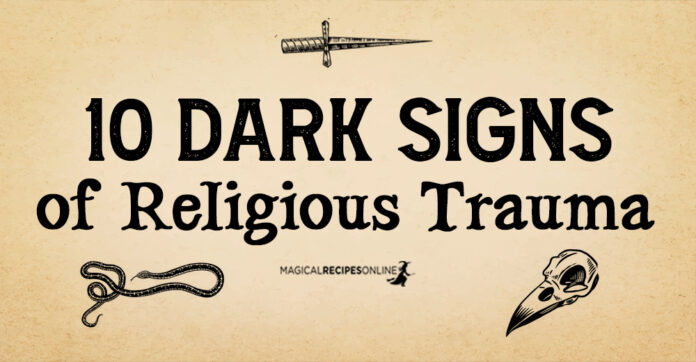Religion can be a source of comfort, strength, and guidance for many individuals. However, there are instances where religious experiences can lead to traumatic effects on one’s mental and emotional well-being. Religious trauma occurs when a person experiences distress, fear, guilt, or shame as a result of their religious beliefs or practices. In this article, we will explore 10 dark signs of religious trauma and discuss how spirituality can help in healing these wounds.
What is Religious Trauma
Many probably first heard of this term. Why? Because the strong religious lobbies won’t easily let this information go viral. But let’s change that, shall we? What few know is that there are many studies discussing how religion can be a source of harm and trauma. Actually this is “something most clinicians know well, yet this fact is underreported in the literature” as this study reports. Religious trauma refers to the adverse psychological and emotional effects resulting from religious experiences that are distressing, harmful, or traumatic. It can manifest in various ways, affecting an individual’s sense of self, relationships, and overall well-being.
Religion vs Spirituality
Although religion and spirituality are often used interchangeably, yet they do have distinct differences. Religion is typically associated with organized institutions, dogmatic beliefs, and specific practices, whereas spirituality is a more individual and inclusive experience that focuses on personal growth and connection to something larger than oneself. While religion can provide a sense of belonging and community, spirituality allows for more introspection and the freedom to explore different beliefs and practices. Ultimately, the choice between religion and spirituality is a personal one and depends on an individual’s values and beliefs.
But first let’s see the 10 dark signs of Religious Trauma and then how to heal them with Spirituality
10 dark signs of Religious Trauma
Although it’s possible to recognize them all do not despair. There are many solutions. After all we are all in this together. Having the same collective memories and religious abuse. So, let’s just recognize them. No attachment. Just observe.
Dark Sign 1: Loss of Faith
Interestingly one of the most significant signs of religious trauma is the loss of faith. Weird right? Constant doubt, esoteric quarrels, unresolved questions, and conflicts in beliefs can shake an individual’s trust in the Unseen World. This loss of faith can lead to feelings of confusion, sadness, and a sense of betrayal. Well, count me in for that. Who else?
Dark Sign 2: Fear and Anxiety
Religious trauma often instills fear and anxiety in individuals and is some very disturbing cases can also lead to ‘soul loss’. Fear of eternal punishment, divine judgment, or the wrath of a higher power can create a constant state of anxiety and distress. The fear of not being “good enough” according to religious standards can be overwhelming.
Dark Sign 3: Shame and Guilt
Religious trauma can be accompanied by intense feelings of shame and guilt. Strict religious doctrines, judgmental attitudes, and moral absolutes can cause individuals to feel guilty for their natural human desires, thoughts, or perceived sins. This shame can have a lasting impact on self-esteem and self-worth.
Dark Sign 4: Cognitive Dissonance
Cognitive dissonance arises when there is a conflict between an individual’s beliefs or values and their religious teachings. Trying to reconcile conflicting ideas can lead to mental and emotional distress, as individuals may feel torn between their authentic selves and the expectations of their religious community.
Dark Sign 5: Social Isolation
Religious trauma can often result in social isolation. When individuals question or leave their religious community, they may face rejection, judgment, or even stigma. Losing a once supportive community can leave individuals feeling alone and disconnected.
Dark Sign 6: Suppression of Individuality
Religious trauma can lead to the suppression of an individual’s unique personality. The pressure to conform to certain religious standards or expectations can inhibit personal growth, creativity, and the exploration of one’s authentic self. This suppression can limit individual expression and fulfillment.
Dark Sign 7: Emotional Manipulation
Some religious contexts may manipulate people emotionally, using fear, shame, or guilt as tools for control. Emotional manipulation can lead to long-lasting psychological damage, eroding individuals’ trust in their own emotions and intuition.
Dark Sign 8: Lack of Critical Thinking
Religious trauma can inhibit critical thinking skills. Religious systems that discourage questioning, doubt, or intellectual curiosity can hinder the development of independent thinking and reasoning abilities. This lack of critical thinking can limit personal growth and prevent individuals from exploring alternative perspectives.
Dark Sign 9: Religious OCD
Religious trauma can also manifest as religious obsessive-compulsive disorder (OCD). Individuals may experience intrusive thoughts, fears, or repetitive rituals related to their religious beliefs. These symptoms can significantly impact daily functioning and contribute to further distress.
Dark Sign 10: Spiritual Bypassing
Spiritual bypassing occurs when individuals use spiritual practices or beliefs to avoid dealing with emotional pain or unresolved trauma. Rather than addressing the root causes of their suffering, individuals may try to bypass their feelings through spirituality, which can hinder healing and personal growth.
How Spirituality deals with Religious Trauma
While religious trauma can be challenging to navigate, spirituality can play a vital role in the healing process. Here are some ways spirituality can aid in recovering from religious trauma:
So what is Spirituality?
Spirituality emphasizes the individual’s unique connection to something greater than themselves. It encourages personal exploration, introspection, and the pursuit of inner peace and growth. Understanding spirituality as distinct from organized religion can open up new possibilities for healing.
Connecting with Inner Beliefs and Values
By exploring one’s inner beliefs and values, individuals can develop a personal connection with spirituality. Connecting with what feels true and authentic to them allows individuals to reclaim their autonomy and establish a sense of meaning outside of religious dogma.
Finding Support in a Spiritual Community or Coven
Seeking out a supportive spiritual community can provide individuals with a sense of belonging and understanding. Engaging with like-minded individuals who have experienced similar religious trauma can foster connection, empathy, and support for the healing process.
Developing Self-Compassion and Self-Worth
Spirituality emphasizes self-compassion and self-worth. Practicing self-care, self-forgiveness, and cultivating a positive self-image can help individuals overcome the shame and guilt associated with religious trauma. This can lead to increased self-acceptance and inner peace.
Cultivating a Healthy Relationship with Spirituality
Choosing a balanced approach to spirituality is crucial in healing from religious trauma. Engaging in spiritual practices that resonate with personal beliefs and values while allowing space for individual interpretation and growth can promote healing and a sense of empowerment.
Religious trauma can have a profound impact on individuals’ mental and emotional well-being. Recognizing the signs and understanding that healing is possible is the first step towards recovery. Incorporating spirituality into the healing process can provide a path towards personal growth, self-discovery, and restoration of inner peace.

